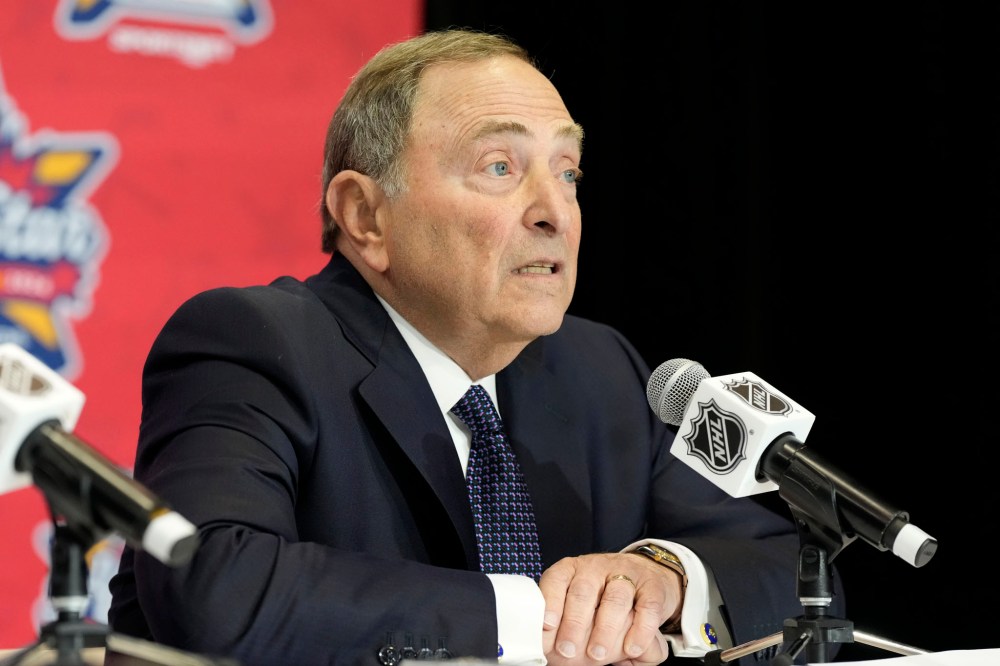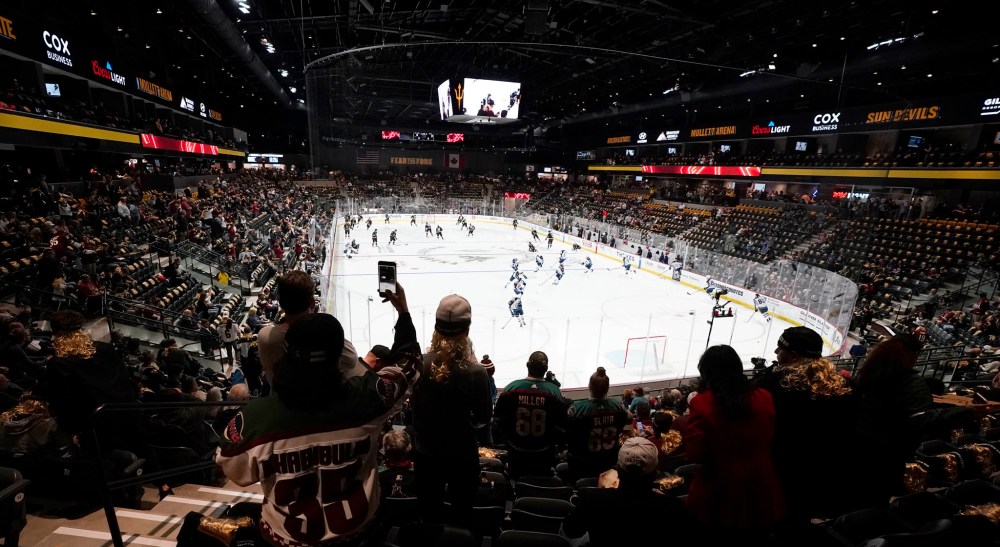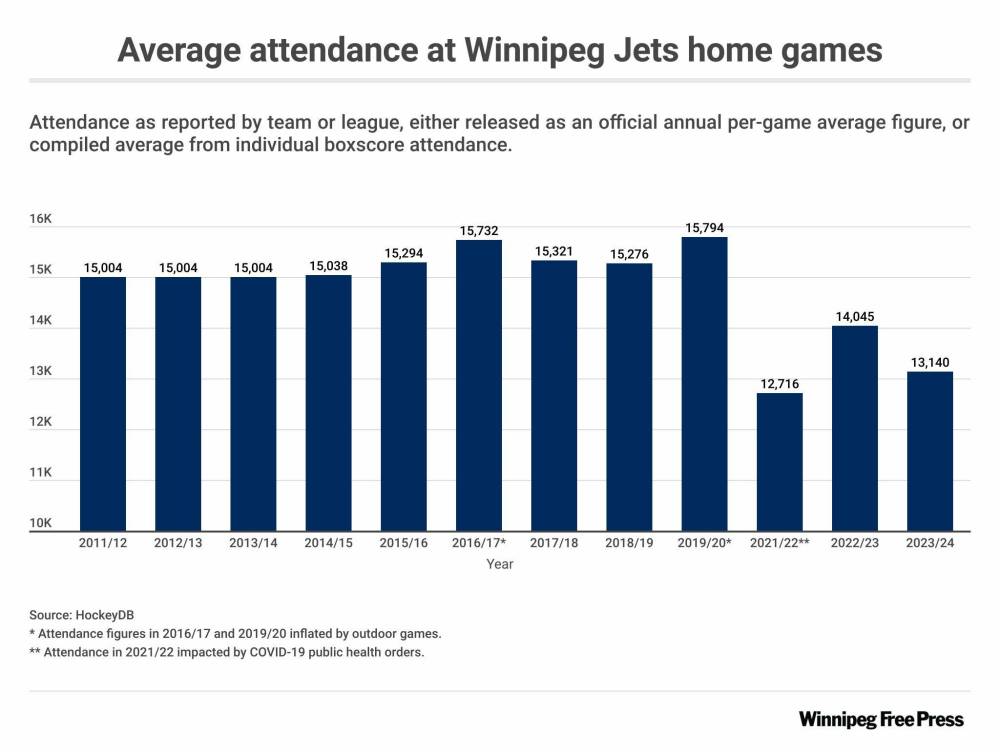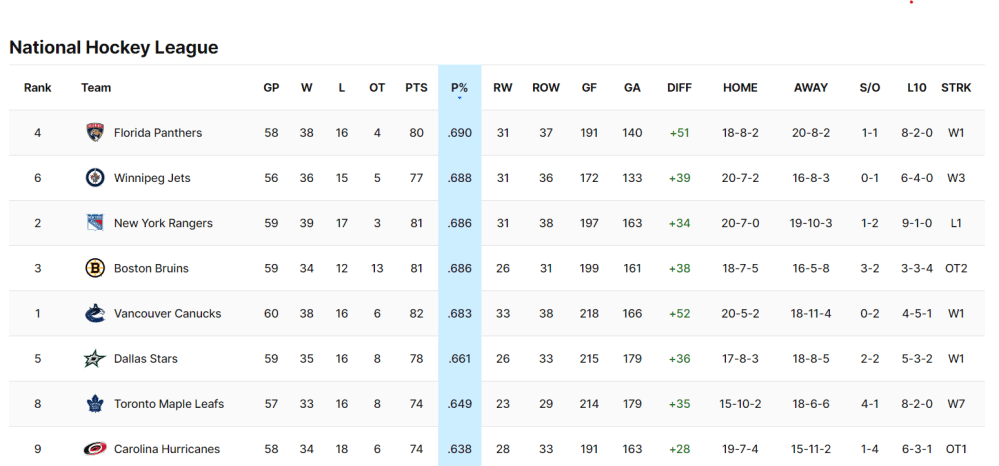No need to panic, yet True North working hard to win back Jets fans
Read this article for free:
or
Already have an account? Log in here »
To continue reading, please subscribe:
Monthly Digital Subscription
$1 per week for 24 weeks*
- Enjoy unlimited reading on winnipegfreepress.com
- Read the E-Edition, our digital replica newspaper
- Access News Break, our award-winning app
- Play interactive puzzles
*Billed as $4.00 plus GST every four weeks. After 24 weeks, price increases to the regular rate of $19.95 plus GST every four weeks. Offer available to new and qualified returning subscribers only. Cancel any time.
Monthly Digital Subscription
$4.99/week*
- Enjoy unlimited reading on winnipegfreepress.com
- Read the E-Edition, our digital replica newspaper
- Access News Break, our award-winning app
- Play interactive puzzles
*Billed as $19.95 plus GST every four weeks. Cancel any time.
To continue reading, please subscribe:
Add Free Press access to your Brandon Sun subscription for only an additional
$1 for the first 4 weeks*
*Your next subscription payment will increase by $1.00 and you will be charged $16.99 plus GST for four weeks. After four weeks, your payment will increase to $23.99 plus GST every four weeks.
Read unlimited articles for free today:
or
Already have an account? Log in here »
Hey there, time traveller!
This article was published 26/02/2024 (735 days ago), so information in it may no longer be current.
There is plenty of worry right now when it comes to the future of the Winnipeg Jets. A visit from Gary Bettman on Tuesday is only adding to the anxiety.
The NHL commissioner is set to meet with Jets co-owner and chairman Mark Chipman, key sponsors and business leaders, members of the media and even some fans in a “fireside chat” prior to puck drop against the St. Louis Blues at Canada Life Centre.
MIKAELA MACKENZIE / FREE PRESS FILES Jets co-owner and chairman Mark Chipman will meet with NHL Commissioner, business leaders, sponsors, media and fans Tuesday.
All of this because Jets attendance has taken a nose-dive this season, which is raising alarm bells within the league’s head office.
Naturally, speculation and consternation are running wild in a market that has already lost the Jets once before only to get a second chance. Folks are understandably sensitive at the thought that could now be in jeopardy.
In an attempt to cut through some of the white noise that is out there, here are some burning questions along with analysis:
What’s the problem?
It boils down to simple economics. The Jets currently have a season-ticket base of approximately 9,500. Furthermore, a waiting list that was reportedly 8,000 names deep has completely vanished.
That’s a big issue, which is illustrated by an average of just 13,140 fans through 29 home dates this year in a rink that holds 15,225 and played home to sellouts for the first decade. That means an average of 2,085 seats have been empty per game, for a total of 60,045 and counting. This, despite the fact the Jets are 20-7-2 at home, and 36-15-5 overall.
As Chipman recently stated, the base needs to get back up to the pre-pandemic range of 13,000 to allow the organization some long-term stability and make it much less reliant on walk-ups. Anything short of that, in a market this size, is in the danger zone.
“I wouldn’t be honest with you if I didn’t say, ‘We’ve got to get back to 13,000,’” Chipman told The Athletic last week. “This place we find ourselves in right now, it’s not going to work over the long haul. It just isn’t.”
Who’s to blame?
The multimillion-dollar question, and one with no shortage of answers depending on who you ask.
Take your pick from a long list that includes the following: The rising cost of living/economic downturn. The price of tickets/parking/concessions. Downtown safety. The erratic on-ice performance from the team in previous years. The game-day experience. Poor customer service from True North. The collapse of some multi-person season ticket packages. The COVID-19 public health orders that turned some fans away.
Another big issue is the lack of corporate support, with Chipman saying only about 15 per cent of all season ticket sales comes from that deep-pocketed demographic. That’s in stark contrast to the other six Canadian markets, where businesses make up anywhere from 45 to 85 per cent of the base, and it puts a ton of extra pressure on the general public to make up the shortfall.
Regardless of where you might point the finger, finding a way to eventually get 3,500 more people to invest in season-tickets is now a top priority.
How dire is the situation?
Obviously Bettman isn’t coming to Winnipeg with the kind of good news that brought him here in the spring of 2011 to announce the purchase and re-location of the Atlanta Thrashers.
He’s also not playing the role of the Grim Reaper. At least not yet.
His drop-in visit is meant to bring a sense of urgency, but we’re nowhere near the point of no return. Will we get some kind of defined timeline from the commissioner? Likely not.

Expect Bettman to deliver a fairly loud and clear message to the market. He’s got plenty of experience playing the villain to hockey fans, after all. Time will ultimately tell if it gets the desired response.
Is this a repeat of Jets 1.0?
To be clear, the circumstances are much, much different then they were in the mid-1990s. True North not only owns the downtown rink — and continues to make considerable investments in it — but plenty of other surrounding real estate.
Co-owner David Thomson is one of the richest in all of pro sports. Chipman fought hard to get the NHL back, and it’s hard to imagine him waving the white flag and allowing hockey history to repeat itself here without a significant fight.
“I can see how someone could ask that question,” Chipman told TSN’s Darren Dreger last fall. “Because it happened once, is it a concern that it’s going to happen again because you’re the smallest market? But I’d say, no, not on our watch.”
There’s also the not-so-insignificant fact that the valuation of the Jets — purchased by True North for US $170 million — is now estimated to be around US $780 million.
There’s also the fact the Jets are routinely spending to the salary cap, including re-signing top stars Mark Scheifele and Connor Hellebuyck last fall to simultaneous seven-year contract extensions worth a combined US $119 million to show how much things have changed around here.
Why is this happening now?
In some ways, the timing couldn’t be better, even if fans may not see it the same way as they fear all of this off-ice noise will become a distraction.
Fact is Winnipeg’s lofty place in the NHL standings — first in the Central Division, first in the Western Conference and second in the NHL based on point percentage — should help the cause.
The organization and the league are trying to strike while the iron is hot. It would be a much harder sell if the Jets were struggling on the ice. Shoring up the organizational foundation now, rather than waiting for the team’s fortunes to take a turn, makes sense.
What about Arizona?
Folks aren’t going to like to hear this, but Winnipeg absolutely is being treated differently than the Coyotes situation, which has them playing in a puny college arena for a second straight season and, it appears, the foreseeable future.
Bettman and company will clearly fight tooth and nail to hold on to that market, which is one of the fastest-growing in the United States. Our little neck of the woods, fair or not, doesn’t get the same luxury. Kicking and stomping over this won’t change the cold, hard reality.

What is the organization doing about it?
Step one: They are clearly admitting to having a problem.
“We’ve had to reinvent ourselves,” Chipman told The Athletic last week. “For 10 years, we weren’t a sales organization; we were a service organization, and I’m not sure we were that good of a service organization, to be honest with you.”
Chipman spoke of personally working the phones to reconnect with former customers in an attempt to find out where things went south and attempt to lure them back. Obviously having Bettman come in to deliver a personal message is another move in the playbook.
Bottom line: They now have to find a way to be both a quality sales and service organization. They can’t afford to get that wrong.
Is there any reason for optimism?
There sure is. The Jets have played 11 home games since Christmas and drawn an average of 14,320 fans. That includes all four sellouts they’ve had this season — against Minnesota, Chicago, Toronto and Pittsburgh. That actually puts them ahead of last year’s 41-game average of 14,045.
In other words, they appear to be trending in the right direction, and it would appear the team is, quite literally, winning some people over. The fact that the Jets drew a robust crowd of 14,324 on Sunday evening against the sad-sack Coyotes is a good sign.
The organization hit all the right notes for the annual WASAC (Winnipeg Aboriginal Sport Achievement Centre) night, including touching pre-game tributes and live arena entertainment, in the latest of a growing list of examples of re-connecting with a community they likely took for granted.
With 12 home dates remaining and what they hope will be a lengthy playoff run this spring, there appears to be plenty of momentum behind them.
mike.mcintyre@freepress.mb.ca
X: @mikemcintyrewpg

Mike McIntyre is a sports reporter whose primary role is covering the Winnipeg Jets. After graduating from the Creative Communications program at Red River College in 1995, he spent two years gaining experience at the Winnipeg Sun before joining the Free Press in 1997, where he served on the crime and justice beat until 2016. Read more about Mike.
Every piece of reporting Mike produces is reviewed by an editing team before it is posted online or published in print — part of the Free Press‘s tradition, since 1872, of producing reliable independent journalism. Read more about Free Press’s history and mandate, and learn how our newsroom operates.
Our newsroom depends on a growing audience of readers to power our journalism. If you are not a paid reader, please consider becoming a subscriber.
Our newsroom depends on its audience of readers to power our journalism. Thank you for your support.
History
Updated on Tuesday, February 27, 2024 8:23 AM CST: Fixes typo










